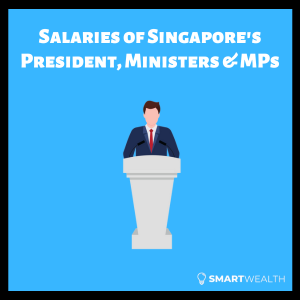The salaries of Singapore’s political office holders are known to be high – much higher than the median income of Singaporeans, which stands at $5,197 per month.
A salary framework review was slated to be conducted in end-2023, but has been deferred as the government is dealing with other pressing issues, such as an unresolved geopolitical situation and uncertainties in the global economy.
In the latest review in 2017, an independent committee concluded that the framework was still relevant and sound, and made a recommendation to increase annual salaries to match benchmark movements. However, as the economy was still in transition, the government decided not to make any changes.
Will we see any changes? Time will tell, but for now, let’s look at the current salaries of Singapore’s president, prime minister, ministers, and members of parliament.
Note: All figures are in Singapore dollars (SGD).
Salaries of the President, Prime Minister, Ministers & MPs in Singapore (Summary)
- The annual salary of Singapore’s president is $1,540,000
- The annual salary of Singapore’s prime minister (PM) is $2,200,000
- An entry-level minister in Singapore draws a salary of $1,100,000 per year
- An elected member of parliament (MP) earns an allowance of $192,500 per year
SIDE NOTE When was the last time you conducted thorough financial planning or reviewed your finances? In this day and age in Singapore, doing so will absolutely improve the quality of life for you and your loved ones. Here are 5 reasons why financial planning is so important.
The Salaries of Ministers in Singapore
The benchmark salary of an entry-level minister (MR4) in Singapore is $55,000 per month or $1,100,000 per year (including bonuses).
Here’s the formula to calculate the annual salary:
Total Annual Salary for MR4 Minister = Fixed (13 Months of Pay) + Variable (Annual Variable Component + Individual Performance Bonus + National Bonus)
Notes: The benchmark salary consists of a fixed pay of 13 months, 1 month of annual variable component, 3 months of individual performance bonus, and 3 months of the national bonus. In total, 20 months of pay equates to $1,100,000, of which $715,000 is fixed and the rest is variable.
How is the benchmark salary of an entry-level minister (MR4) determined? It is based on the median income of the 1,000 highest-earning Singapore citizens, with a 40 per cent discount to reflect the ethos of political service, according to the Public Service Division’s website.
The salary of an MR4 Minister is an important one because the salaries of other political appointment holders are in ratio to the MR4, reflecting the different roles and responsibilities.
Here are the salaries of different political appointment holders:
| Grade | Current Annual Salaries | Ratios Compared with MR4 |
| Prime Minister | $2,200,000 | 2.00 |
| Deputy Prime Minister | $1,870,000 | 1.70 |
| MR1 Minister | $1,760,000 | 1.60 |
| MR2 Minister | $1,540,000 | 1.40 |
| MR3 Minister | $1,320,000 | 1.20 |
| MR4 Minister | $1,100,000 | 1.00 |
| Senior Minister of State | $935,000 | 0.85 |
| Minister of State | $770,000 | 0.70 |
| Mayor | $660,000 | 0.60 |
| Senior Parliamentary Secretary | $572,000 | 0.52 |
| Parliamentary Secretary | $418,000 | 0.38 |
Note: The above salaries are based on the assumption of 1 month of annual variable component, of good individual performance, and that targets for the national bonus are met.
It is also important to note that while ministers may hold multiple appointments, they can only receive one pay package.
Additionally, as ministers hold dual roles, they receive ministerial salaries on top of their MP allowance (currently at $192,500 per year).
The Salary of Singapore’s Prime Minister
The benchmark salary of the prime minister of Singapore is $2,200,000 per year (including bonuses). This is twice that of an entry-level minister.
Unlike other ministers, there is no one to evaluate the prime minister’s individual performance, so the salary package only includes the monthly salary, 13th-month bonus, annual variable component, and national bonus.
The national bonus is based on 4 socio-economic indicators weighted equally:
- Real median income growth rate of the average Singaporean
- Real income growth rate of the lowest 20th percentile of Singaporean income earners
- Unemployment rate of Singaporeans
- Real gross domestic product (GDP) growth rate
In Singapore, the prime minister is the head of government and serves for a term of 5 years.
Here are the current and past prime ministers in Singapore:
| Name | Term of Office |
| Lee Kuan Yew | 1959 – 1990 |
| Goh Chok Tong | 1990 – 2004 |
| Lee Hsien Loong | 2004 – Present |
DID YOU KNOW? According to a survey conducted by MoneySense, about 3 out of 10 Singapore residents aged 30 to 59 had not started planning for their future financial needs. This isn't surprising because personal finance can seem complicated and daunting. But really, there are only a few things that you should focus on. Learn how to significantly improve your personal finances with the 7-step "wedding cake" strategy today.
The Salary of Singapore’s President
The benchmark salary of the president of Singapore is $1,540,000 per year (including bonuses). This is 70% of the prime minister’s salary package.
The president’s monthly salary is the same as the prime minister. The president also receives the 13th-month bonus and annual variable component, but not the performance bonus nor the national bonus.
The president of Singapore is the head of state and serves for a term of 6 years.
The president doesn’t set national policies and doesn’t have direct executive responsibility for governing the country (except for his/her custodial role). One key role that the president has is to safeguard the national reserves of Singapore (close to $1 trillion based on published information).
Here are Singapore’s current and past presidents:
| Name | Term of Office |
| Yusof Ishak | 1965 – 1970 |
| Benjamin Sheares | 1971 – 1981 |
| Devan Nair | 1981 – 1985 |
| Wee Kim Wee | 1985 – 1993 |
| Ong Teng Cheong | 1993 – 1999 |
| S. R. Nathan | 1999 – 2011 |
| Tony Tan Keng Yam | 2011 – 2017 |
| Halimah Yacob | 2017 – 2023 |
| Tharman Shanmugaratnam | 2023 – Present |
Note: The above list doesn’t include acting presidents.
The Allowance for Members of Parliament (MPs) in Singapore
The allowance for an elected member of parliament (MP) is $192,500 per year. The allowance for a non-constituency member of parliament (NCMP) or a nominated member of parliament (NMP) is $28,900 per year, or 15% of an elected MP’s allowance.
As MPs are elected, they hold two roles. Their community-based role is to look after the needs of their constituents and raise their concerns in parliament. Their legislative role allows them to influence decisions on government budgets and enact or amend legislation.
NCMPs and NMPs don’t have constituents, so they don’t have a community role, which is why their allowances are significantly lower than MPs.
Ministers earn their ministerial salaries on top of their MP allowance. For MPs who aren’t ministers or don’t hold other appointments, they can still hold full-time jobs.
Why Are Singapore’s Politicians Paid So Much?
Singapore’s politicians are known to be the highest paid in the world.
Is there a reason for this?
According to the Public Service Division (PSD), the government looks for people with a strong sense of public service, but knows that that alone might not be enough to run a country well. There are other qualities that it looks for, such as organisational and leadership capabilities, capacity to handle multiple responsibilities, and the ability to take charge in a crisis. Those who are in the top 1,000 earners tend to have a reasonable level of those qualities and abilities. This is why ministerial salaries are benchmarked to that group of people, but with a 40% discount.
Prime Minister Lee Hsien Loong has also stated that ministers earn a clean wage, meaning that the salary is the only remuneration that they receive. There aren’t any hidden or additional perks that come with the job.
What’s Next?
Ministerial salaries and MP allowances aren’t set in stone. Changes upward or downward can still happen, depending on what the government decides to do based on the outcome from the independent committee.
In my opinion, Singaporeans tend to be practical, and always want to compare what they have with what’s out there. Even if one has a strong sense of public service, there remains a nagging feeling of being “under-paid” when compared to what can be achieved elsewhere. So, in order to attract the top talents, competitive pay has to be given; if not, potential candidates could just stick to the private sector.
In addition, once one enters public service, his/her life isn’t the same anymore because of the increased scrutiny, especially when he/she is out in public.
It does take a certain someone to be competent and strive for the greater good of Singapore, yet accept being judged constantly.
While the salaries of others can be interesting to know, your income matters the most. You should always try to increase it by upgrading yourself for the betterment of your career, getting better returns from surplus cash through investments, and protecting your income/assets through the use of insurance (such as term insurance, whole life insurance, and more).


